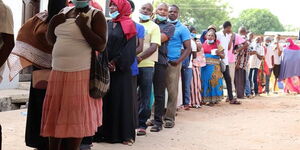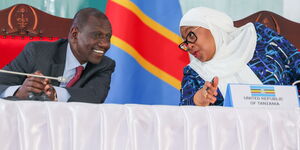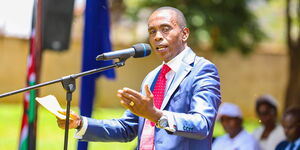The Ethics and Anti-Corruption Commission (EACC) has launched an audit of the National Health Insurance Fund (NHIF) systems, which is undergoing restructural changes.
On Thursday, Vincent Okongo, EACC Director of Preventive Services, stated that the audit's sole purpose was to identify and seal corruption loopholes and not an investigation into the agency.
The NHIF-EACC Fraud Prevention Audit launch was done at NHIF's head offices along Ragati Road, in Upper Hill Nairobi.
"We are delighted that the NHIF management and board invited us to come and review their systems, policies and procedures of work with a view to identifying gaps, loopholes, and opportunities that may be lending credence to corrupt practices within the Fund," Okongo stated.
The Director added that it is routine for EACC to carry out prevention of corruption, especially in the health sector. EACC has undertaken such reviews of systems at Kenyatta National Hospital, the Universal Health Coverage in pilot counties, the Kenya Medical Practitioners and Dentist Board and the Kenya Medical Supplies Agency (KEMSA).
NHIF, he said, is a critical agency in ensuring Kenyans are able to access healthcare. The review will support the Fund to strengthen its accountability, transparency and governance systems.
The two agencies agreed that EACC, in the future, would assist NHIF in capacity building at the board, management and staffing levels with the aim of enhancing mindset and behaviour change towards better service delivery to Kenyans.
EACC will undertake the audit in 45 days, commencing today and ending on October 24, before using another similar period to compile a comprehensive report. The two agencies would then agree on a timeline for release and implementation.
In summary, EACC seeks to establish the extent to which the existing policies and institutional frameworks support corruption prevention in the Fund's operations, examine the extent to which the existing administrative arrangements support the integration of corruption prevention mechanisms for day-to-day operation, identify loopholes used to perpetuate corrupt practices, review structures and mitigation measures put in place to prevent corruption and provide recommendation on how to seal the loopholes and enhance accountability.
"The scope of the investigation will target the technical functions at NHIF, identified private and public hospitals and key stakeholders in the health sector, including the Ministry of Health, KEMSA, KMPDU, Insurance Regulatory Authority, Kenya Health Federation, Association of Kenya Insurance and sampled county hospitals and national referral hospitals.
"EACC will conduct formal and informal interviews with staff at NHIF, the Ministry, health providers and other stakeholders. We will also observe processes and application of procedures related to service delivery and conduct substantive tests to ascertain compliance. We will also review legislation, work instructions and guidelines, operation circulars and other documents," Okongo explained.
Among the members of the EACC audit team include Neema Mkorori, principal accountant, Engineer Peninah Musyoka, assistant director of prevention, Daniel Barmoiben, prevention officer and procurement specialist, Serah Kibaki, an economist, Consolata Ogola, a legal specialist and John Ndeche, an ICT specialist.
NHIF Board chairman, Engineer Michael Kamau, welcomed the exercise, concurring that EACC visited the health agency by an invitation.
"We prepare policies on certain issues, say corruption prevention, but they are not evaluated by anyone else. The systems are enacted once the board approves them. Do they fall short of expectations of being good policies? That's one of the things we are looking into.
"Do we have gaps that would help us prevent corruption once sealed as we develop more policies or improve on those we have? Are our systems robust enough to prevent corruption? That's why EACC is here," Kamau, a former Cabinet Secretary for Transport, stated.
The engineer was appointed chair of the NHIF board by President William Ruto in December 2022 for a period of three years. As his tenure takes shape, he wants to ascertain whether the agency's management structure is predisposed to corruption, a vice Ruto pledged to curb.
"They are going to help us walk through the process as we are hosting them. They have listed their experience and where they have done similar works and have had good results," Kamau added.
"NHIF requires oversight as our systems have not been audited. Therefore, this is an audit of what we think we have created for ourselves but has not been subjected to a peer review mechanism. When I came to the board, one of the things that was clear to me was the lack of oversight by the Ministry, which was cited in a report by a panel of experts. We cannot do everything for ourselves, equal to investigating, being the prosecutor and the judge," the NHIF board chair emphasised.
He asked EACC to audit how NHIF handles both internal and external influences and a new IT automation system it is procuring.
"The President, if you have listened to him over the last week, was perceived to have spoken off the cuff, but he repeated his statements (against corruption) yesterday. Do not think that it is something external, only affecting people out there. The statement is for all of us to internalise. I am not saying we are corrupt, but we ought run away from it as far as we can," the former CS reiterated Ruto's agenda to fight graft.
NHIF acting CEO, Samson Kuhora, stated that the agency needs to improve its service delivery despite putting in place key measures to curb graft.
"EACC is here to help us with prevention as opposed to investigation, as it has always been. We have a mandate as a Fund to finance healthcare and ensure it is accessible and of high quality and does not impoverish families. Medical fraud is not new to the Fund; it is a challenge within the industry, but we need better internal measures to respond to such challenges. Some stem from the beneficiaries we have and we put measures to stop identity theft, but then can we make it better," Kuhora added.
EACC Audit comes after the Cabinet approved the proposal to split the National Health Insurance Fund (NHIF) into three separate Funds; the Primary Healthcare Fund, Health Insurance Fund, and Emergency, Chronic and Critical Illness Fund.
Following the Cabinet's resolution, four bills were forwarded to Parliament as the first step towards operationalising Universal Health Coverage.
The bills include The Primary Health Care Bill 2023, The Digital Health Bill 2023, The Facility Improvement Financing Bill 2023, and the Social Health Insurance Bill, 2023. Cabinet proposals are part of President William Ruto's plans to provide Universal Health Coverage (UHC) and make it more accessible to Kenyans.
NHIF contributed to splitting the original Fund, but it has yet to receive the Bills forwarded to the President. However, engineer Michael Kamau is optimistic about the changes and enhancing the agency's service delivery.












